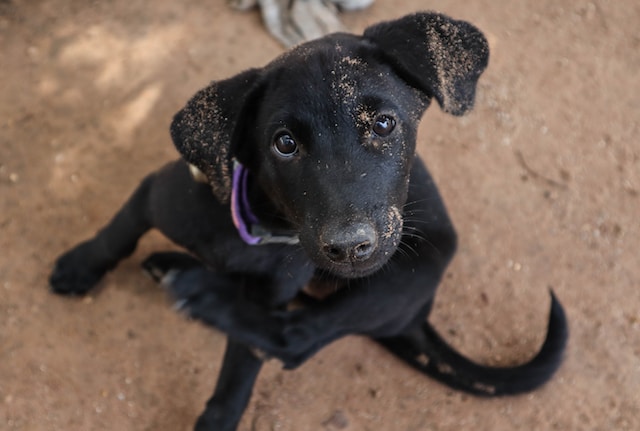Fleas– tiny, agile, and incredibly annoying. These pests infest our furry friends, causing endless discomfort and skin conditions.
We all know fleas can cause a terrible itch for our pets, but can humans get fleas, too?
In this blog, we’ll explore the intriguing world of fleas, answering the age-old question: “Can humans get fleas?” Plus, if you’ve got fleas on your property, don’t forget to contact proof. Pest Control for our expert flea services.
Can Humans Get Fleas?
Before we dive into the nitty-gritty of human-flea interactions, it’s essential to understand what makes them so troublesome.
Fleas are small, wingless insects known for their remarkable jumping abilities and penchant for feeding on the blood of warm-blooded hosts. While pets like dogs and cats are common victims, fleas can also target humans.
So, can humans get fleas?
The short answer is yes, humans can get fleas, although they aren’t their preferred hosts. While fleas typically prefer feasting on the blood of animals, when the opportunity arises, they won’t hesitate to bite humans. But how do these little critters end up on us?
- Animal Hosts: The most common way humans get fleas is through their pets. If your cat or dog is infested with fleas, these insects can easily jump onto your clothing or skin when you come into contact with them. This is why veterinarians and pet groomers are at higher risk of encountering fleas.
- Environmental Exposure: Fleas don’t need animals as a host to survive; they can lay dormant in your environment, such as carpets, bedding, or upholstery. When you walk through an area infested with flea eggs or larvae, they can latch onto your shoes and clothes and eventually find their way to your skin.
- Wildlife Contact: In some cases, fleas can be transmitted from wildlife to humans. If you spend time in areas where wild animals like raccoons, opossums, or squirrels are present, you could inadvertently pick up fleas from them.
Fleas infesting humans is relatively uncommon when contrasted with the widespread prevalence of these pests on animals. Nevertheless, the likelihood of human-flea encounters can fluctuate based on geographical location and personal situations.

Can humans get fleas anywhere, though? In regions teeming with abundant wildlife and outdoor pets, the chances of humans playing host to fleas may rise. Conversely, in areas where pets receive meticulous grooming and frequent flea treatments, the risk of such infestations is notably diminished.
Why Humans Get Fleas
Fleas, while not particularly picky, prefer animal hosts due to their ability to provide a consistent blood supply and the relative ease of accessing the furry hide of animals. However, they might bite humans for several reasons:
- Hunger: When fleas can’t find their preferred host (usually a pet), they’ll bite humans out of sheer hunger.
- Proximity: You may become an easy target if you’re near an infested area, like your pet’s favorite sleeping spot.
- Random Encounters: Sometimes, it’s simply a matter of bad luck. Fleas may jump onto you at random, searching for a blood meal.
How Long Do Fleas Stay on Humans?
If you’re unfortunate enough to experience a flea bite, you might be curious about how long these unwelcome intruders plan to stick around. Fortunately, fleas aren’t particularly partial to human blood and prefer animals.

As a result, they don’t tend to hang around on human hosts for extended periods. Their stay on humans typically lasts a few hours to a couple of days, during which they have a blood meal before exiting.
Following their meal, fleas typically leap off in search of their preferred host, often a pet. Their brief presence on humans is largely due to the differences between human and animal blood and the absence of suitable conditions for laying eggs on human skin.
Dealing with Flea Bites
If you suspect fleas have bitten you, there are steps you can take to alleviate the discomfort and prevent further infestations:
- Wash and Disinfect: Clean the affected area with warm water and mild soap. This helps prevent infection from scratching.
- Anti-Itch Remedies: Apply over-the-counter anti-itch creams or ointments to reduce itching and inflammation.
- Wash Your Clothes and Bedding: Launder your clothes, bedding, and pet’s bedding in hot water to eliminate any potential fleas or eggs.
- Treat Your Pet: If you have pets, treat them with a suitable flea control product, as your veterinarian recommends. Check out this handy guide for more information.
- Vacuum and Clean: Thoroughly vacuum carpets, rugs, and upholstery. Empty the vacuum bag or canister promptly and dispose of the contents away from your home.
If the infestation persists, consider seeking professional pest control services to address the problem.

At proof. Pest Control, we understand the frustration and discomfort that stubborn flea infestations can bring to your home. That’s why our team is dedicated to providing comprehensive pest control solutions as part of our Pest-Free Guarantee service. When it comes to fleas, our experts are well-equipped to tackle even the most challenging infestations.
Don’t let stubborn flea infestations disrupt your peace of mind—contact proof. Pest Control today, and experience the difference our dedicated team can make in keeping your home pest-free and comfortable.

